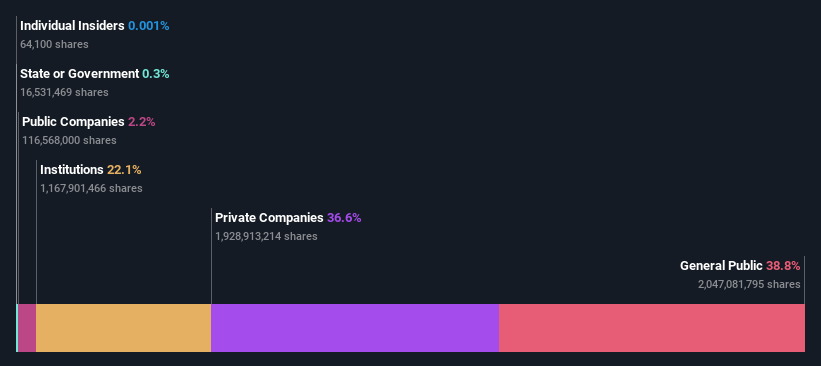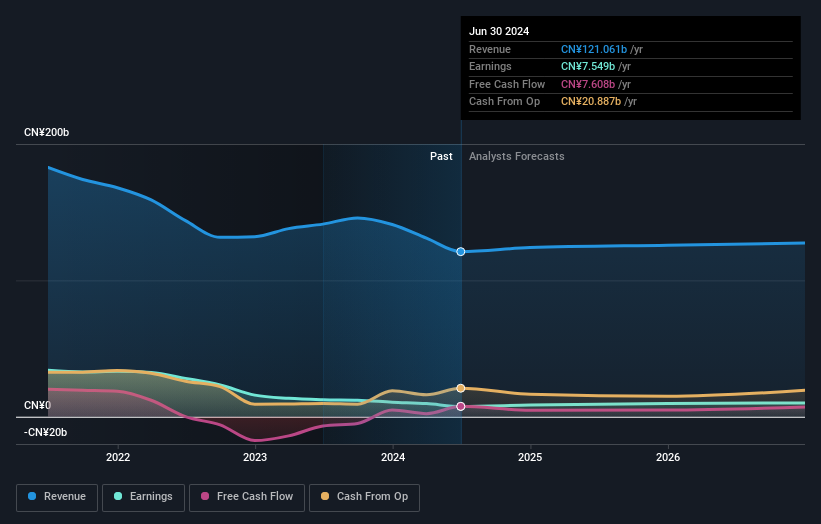- Hong Kong
- /
- Basic Materials
- /
- SEHK:914
Anhui Conch Cement Company Limited's (HKG:914) largest shareholders are retail investors who were rewarded as market cap surged HK$16b last week

Key Insights
- Significant control over Anhui Conch Cement by retail investors implies that the general public has more power to influence management and governance-related decisions
- The top 11 shareholders own 50% of the company
- 22% of Anhui Conch Cement is held by Institutions
To get a sense of who is truly in control of Anhui Conch Cement Company Limited (HKG:914), it is important to understand the ownership structure of the business. With 39% stake, retail investors possess the maximum shares in the company. In other words, the group stands to gain the most (or lose the most) from their investment into the company.
As a result, retail investors were the biggest beneficiaries of last week’s 14% gain.
Let's take a closer look to see what the different types of shareholders can tell us about Anhui Conch Cement.
See our latest analysis for Anhui Conch Cement

What Does The Institutional Ownership Tell Us About Anhui Conch Cement?
Many institutions measure their performance against an index that approximates the local market. So they usually pay more attention to companies that are included in major indices.
Anhui Conch Cement already has institutions on the share registry. Indeed, they own a respectable stake in the company. This implies the analysts working for those institutions have looked at the stock and they like it. But just like anyone else, they could be wrong. If multiple institutions change their view on a stock at the same time, you could see the share price drop fast. It's therefore worth looking at Anhui Conch Cement's earnings history below. Of course, the future is what really matters.

Hedge funds don't have many shares in Anhui Conch Cement. The company's largest shareholder is Anhui Conch Group Co., Ltd, with ownership of 37%. Meanwhile, the second and third largest shareholders, hold 3.0% and 2.2%, of the shares outstanding, respectively.
After doing some more digging, we found that the top 11 have the combined ownership of 50% in the company, suggesting that no single shareholder has significant control over the company.
Researching institutional ownership is a good way to gauge and filter a stock's expected performance. The same can be achieved by studying analyst sentiments. Quite a few analysts cover the stock, so you could look into forecast growth quite easily.
Insider Ownership Of Anhui Conch Cement
The definition of company insiders can be subjective and does vary between jurisdictions. Our data reflects individual insiders, capturing board members at the very least. Management ultimately answers to the board. However, it is not uncommon for managers to be executive board members, especially if they are a founder or the CEO.
I generally consider insider ownership to be a good thing. However, on some occasions it makes it more difficult for other shareholders to hold the board accountable for decisions.
Our most recent data indicates that insiders own less than 1% of Anhui Conch Cement Company Limited. But they may have an indirect interest through a corporate structure that we haven't picked up on. Being so large, we would not expect insiders to own a large proportion of the stock. Collectively, they own HK$1.8m of stock. It is always good to see at least some insider ownership, but it might be worth checking if those insiders have been selling.
General Public Ownership
The general public, who are usually individual investors, hold a 39% stake in Anhui Conch Cement. This size of ownership, while considerable, may not be enough to change company policy if the decision is not in sync with other large shareholders.
Private Company Ownership
It seems that Private Companies own 37%, of the Anhui Conch Cement stock. It's hard to draw any conclusions from this fact alone, so its worth looking into who owns those private companies. Sometimes insiders or other related parties have an interest in shares in a public company through a separate private company.
Next Steps:
It's always worth thinking about the different groups who own shares in a company. But to understand Anhui Conch Cement better, we need to consider many other factors. For example, we've discovered 1 warning sign for Anhui Conch Cement that you should be aware of before investing here.
But ultimately it is the future, not the past, that will determine how well the owners of this business will do. Therefore we think it advisable to take a look at this free report showing whether analysts are predicting a brighter future.
NB: Figures in this article are calculated using data from the last twelve months, which refer to the 12-month period ending on the last date of the month the financial statement is dated. This may not be consistent with full year annual report figures.
New: Manage All Your Stock Portfolios in One Place
We've created the ultimate portfolio companion for stock investors, and it's free.
• Connect an unlimited number of Portfolios and see your total in one currency
• Be alerted to new Warning Signs or Risks via email or mobile
• Track the Fair Value of your stocks
Have feedback on this article? Concerned about the content? Get in touch with us directly. Alternatively, email editorial-team (at) simplywallst.com.
This article by Simply Wall St is general in nature. We provide commentary based on historical data and analyst forecasts only using an unbiased methodology and our articles are not intended to be financial advice. It does not constitute a recommendation to buy or sell any stock, and does not take account of your objectives, or your financial situation. We aim to bring you long-term focused analysis driven by fundamental data. Note that our analysis may not factor in the latest price-sensitive company announcements or qualitative material. Simply Wall St has no position in any stocks mentioned.
About SEHK:914
Anhui Conch Cement
Manufactures, sells, and trades in clinker and cement products in China and internationally.
Excellent balance sheet average dividend payer.


